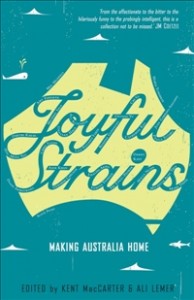Sophia Barnes reviews “Joyful Strains” Ed Kent MacCarter and Alison Lemer
Edited by Kent MacCarter and Alison Lemer
Affirm Press, 2013
ISBN 9780987308535
Reviewed by SOPHIA BARNES
Joyful Strains is introduced to us by Arnold Zable as a testament to the spirit of the PEN International project, bringing together a vibrant and engaging, by turns moving and hilarious, collection of stories. These are all accounts of immigration in its various shapes and forms, whether motivated by death, war, hope, ambition, desperation, love or curiosity. Migrants see their hopes realised or dashed, confront loss and new life, faith abandoned or refreshed, languages forgotten, learned and relearned, personal and cultural histories reinvigorated or challenged. Dmetri Kakmi’s ‘Night of the Living Wog’ is the perfect opener to the collection, reminding us as it does, with its wry humour and sparkling imagination, the power of art to enable the articulation and thereby the comprehension of our experience. As a young Turkish boy told he is now Greek and finding himself in Australia, Kakmi discovers his very own TARDIS in the television: a small, shiny black box which contains more than its size could ever seemingly allow. The reader can’t help but reflect that what Australian television does for Kakmi is what literature does also: a slim collection of pages with its black type crawling across an off-white page contains a world of diversity, stretching from the second decade of the new millennium back into the formative years of the twentieth-century, across nations, oceans and continents.
What is the immigrant experience of Australia? A trick question, really; for there is no more an immigrant experience than there is an immigrant. The story of migration is an entirely personal as much as it is a shared one—and it is only through the personal that we can begin to understand just how ambivalent the sensation of emigration, immigration, exile or assimilation can be. In a beguiling formulation Chi Vu speaks of her birth language as a set of ‘limbs’ that remain “under my jacket, weak and pale, yet ageing with the rest of me”, as the ‘alien’ limbs of English grow “strong through daily use”. Ali Alizadeh struggles to find the words and to tame the grammar that will convey his love for a young Australian girl named Sally whose individual acceptance of him, if given, might transcend the rejection of a cruel schoolyard and its uncaring wardens. Kakmi’s televisual mentors teach him the ways of the world; like him, they are strangers in a strange land, whose bewildered discoveries mirror his own. The strongest stories in this collection are the ones that illuminate the experience of belonging (or not – and to what?) through the lens of the intimate, the particular and even the peculiar.
The distance between the old home and the new is not always, or not only, geographical. For Amy Espeseth it is a distance made deeper and more insurmountable by the barrier of lost faith. For her the past must be remade as an imaginary country, the friend of her childhood a spectre of what might have been rather than what is. This notion of the imaginary country, the land of memory and of inspiration, recurs throughout Joyful Strains, for it is in the imagination that the lands which migrants have left continue to flourish, to grow—even beyond the hazy boundaries of their own reality. The “rain-soaked earth and bruised grass”, the vibrant flame trees, the “lazy rivers and the sound of wood doves in the trees” become the memory world on which Malla Nunn will continue to draw and which she will eventually weave into her fiction.
What Joyful Strains brought home to me—if you will excuse the expression—is the sheer diversity of Australian immigrant experience. It may seem a truism but if so it is one which seems regularly to get lost in each new wave of discrimination and recrimination as partisan game-players use the easy target of desperate refugees to score empty political points. As an umpteenth-generation Australian, whose family tree (depending on who’s telling the story) yields a genuine bona fide first-fleet convict, I can claim nothing approximating an experience of exile, of racial discrimination, or of the uncanny sensation felt by Chi Vu as she catches herself thinking in her adopted language for the first time. Given the politically-charged nature of any current debate about migration, where poisonous and often outright-misleading language abounds, there tends to be little reflection on the way that each successive wave of migration has garnered a similar reaction. The prophecies of disaster have never come true, yet the language of ‘floodgates’, the image of a tide of immigrants who will drown our shores, persists. Never mind that those who warn us are themselves more often than not as much the children of Australia’s migrant history as those whose names might be slightly harder to pronounce, whose accents might be that little bit thicker. One can only hope that this important collection will do its part to remind us how tired these warnings of disaster are, and how rich and enviable is our cultural, ethnic, religious and linguistic diversity.
The breadth and variety of individual stories of the journey to Australia from any number of birthplaces, the cacophony of different languages and dialects spoken in any number of Australian schools, homes, pubs, cafes, parks and community centres, is what Joyful Strains attempts to capture—and to my mind, it succeeds.
SOPHIA BARNES is a Postgraduate Teaching Fellow in the Department of English at the University of Sydney, where her Ph.D is currently under examination. She has published academic work internationally, and has had creative writing published in WetInk Magazine. In 2013 she was shortlisted for the WetInk / CAL Short Story Prize for the second year running.
